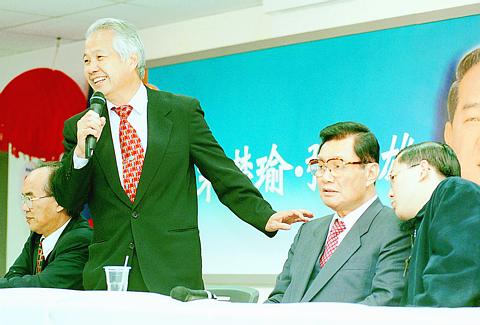Members of KMT breakaway James Soong's (宋楚瑜) political party have decided to directly elect their chairman, in an apparent bid to distinguish themselves from the defeated KMT.
"The party's members will directly elect their chairman," said Soong campaign manager and former Judicial Yuan president Liu Sung-pan (
Soong, who was expelled from the KMT after launching an independent presidential bid last year, has repeatedly criticized his former party's procedures as "undemocratic." He and his supporters argue that he would have won the KMT nomination if the party had allowed its members to choose their official candidate.

PHOTO: CHIANG YING-YING, TAIPEI TIMES
KMT Chairman Lee Teng-hui (李登輝) -- who quit his post yesterday under pressure to take responsibility for the party's resounding election defeat -- nominated Vice President Lien Chan (連戰) to be the party's candidate.
Following last week's election results, a growing number of grassroots members and legislators have echoed Soong's criticism of the KMT's procedures.
Taipei Mayor Ma Ying-jeou (馬英九) and top Lien campaign official Chen Shei-saint (陳學聖) are just a few of the prominent KMT members to advocate massive reform -- including a direct election of Lee's successor as chairman.
Ma, Chen and many of the party faithful blame the KMT's election defeat on the growing distance between the grassroots and its leadership.
In last week's presidential election, KMT candidate Lien won 2.9 million votes to Soong's 4.7 million. The KMT has 2 million registered members.
"Where are our members?" Ma asked on Sunday.
Ma and Chen said a direct chairmanship election should be top priority for a general congress to be held within the next few months.
As Soong and the KMT battle for party members, the issue of intraparty democracy could prove to be a hot issue.
Soong's camp decided to upgrade its populist image with a name change they said better reflects their ideals: the "People First Party" (
Soong, however, remains coy about whether he will chair his new party.
Yesterday, the United Evening News reported that Soong did not plan to act as temporary chairman, and that he wanted to be an "ordinary member."
"There is a good chance that the temporary chairman and the directly elected one will be different people," said Soong campaign staffer Chou Hsi-wei (周錫瑋) following the meeting yesterday. He declined to comment on who the temporary or permanent candidates would be.
There is a place for Soong whatever he decides to do, Liu said yesterday.
"Mr Soong will definitely be doing important political work for the party ... if he wants to be chairman, we won't argue," Liu said.
The party will choose a temporary chairman after the National Assembly elections in May, Liu said.

CHAOS: Iranians took to the streets playing celebratory music after reports of Khamenei’s death on Saturday, while mourners also gathered in Tehran yesterday Iranian Supreme Leader Ayatollah Ali Khamenei was killed in a major attack on Iran launched by Israel and the US, throwing the future of the Islamic republic into doubt and raising the risk of regional instability. Iranian state television and the state-run IRNA news agency announced the 86-year-old’s death early yesterday. US President Donald Trump said it gave Iranians their “greatest chance” to “take back” their country. The announcements came after a joint US and Israeli aerial bombardment that targeted Iranian military and governmental sites. Trump said the “heavy and pinpoint bombing” would continue through the week or as long

TRUST: The KMT said it respected the US’ timing and considerations, and hoped it would continue to honor its commitments to helping Taiwan bolster its defenses and deterrence US President Donald Trump is delaying a multibillion-dollar arms sale to Taiwan to ensure his visit to Beijing is successful, a New York Times report said. The weapons sales package has stalled in the US Department of State, the report said, citing US officials it did not identify. The White House has told agencies not to push forward ahead of Trump’s meeting with Chinese President Xi Jinping (習近平), it said. The two last month held a phone call to discuss trade and geopolitical flashpoints ahead of the summit. Xi raised the Taiwan issue and urged the US to handle arms sales to

State-run CPC Corp, Taiwan (CPC, 台灣中油) yesterday said that it had confirmed on Saturday night with its liquefied natural gas (LNG) and crude oil suppliers that shipments are proceeding as scheduled and that domestic supplies remain unaffected. The CPC yesterday announced the gasoline and diesel prices will rise by NT$0.2 and NT$0.4 per liter, respectively, starting Monday, citing Middle East tensions and blizzards in the eastern United States. CPC also iterated it has been reducing the proportion of crude oil imports from the Middle East and diversifying its supply sources in the past few years in response to geopolitical risks, expanding

Pro-democracy media tycoon Jimmy Lai’s (黎智英) fraud conviction and prison sentence were yesterday overturned by a Hong Kong court, in a surprise legal decision that comes soon after Lai was jailed for 20 years on a separate national security charge. Judges Jeremy Poon (潘兆初), Anthea Pang (彭寶琴) and Derek Pang (彭偉昌) said in the judgement that they allowed the appeal from Lai, and another defendant in the case, to proceed, as a lower court judge had “erred.” “The Court of Appeal gave them leave to appeal against their conviction, allowed their appeals, quashed the convictions and set aside the sentences,” the judges